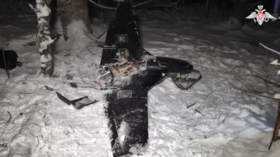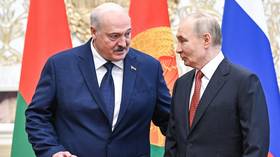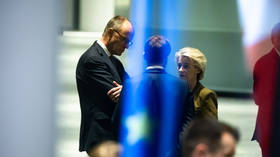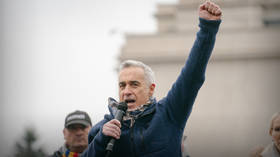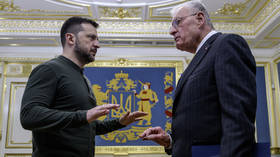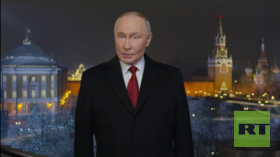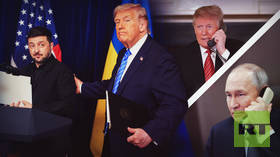Both Russia & UK lose when co-operation frozen – Lavrov
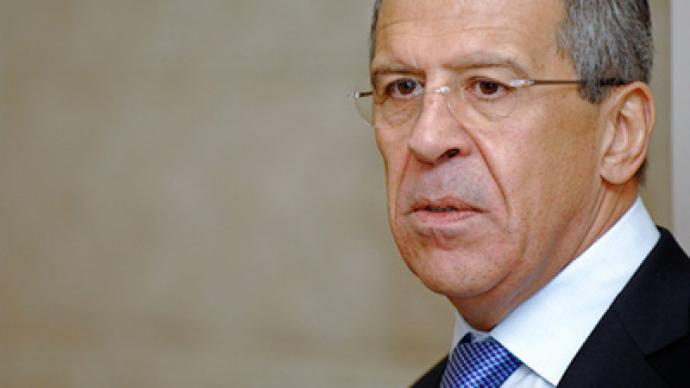
Ahead of his visit to London, Russia’s Foreign Minister Sergey Lavrov spoke in an interview with the BBC about the prospects of Russia-UK’s uneasy relations.
Below is the full transcript of the interview. Q:You’re visiting London – where do you see the status of British-Russian relations now?Sergey Lavrov: Well I think both Moscow and London want to promote these relations. They have history going back many centuries. There were ups and downs from time to time, but in most cases when it was critical for the Europeans’ and for world affairs, Britain and our country stick together. And I hope that this particular moment when the new government came to power in UK after the two meetings between the president and the prime minister, they met last year in Canada and Korea, I think they have good personal relations. I think I have the right chemistry with William Hague [UK Foreign Secretary]. And I believe that both countries, both leaders, want to go forward without of course closing the eyes on the difficult issues, which are still on our agenda, trying to resolve those issues on a step-by-step, persistent basis, but not allowing them to prevent us from co-operating for the mutual benefit of the two countries in the areas where we can do so – and there are plenty. This is, of course, true for our economic co-operation. This is the real foundation of our relationship. The business is very active. The foreign investments from the UK are, I think, the biggest in the Russian Federation – certainly the UK is the leader in this area. And many international issues unite us, we work together in the United Nations, including the Security Council, in G8, G20, on the Iranian nuclear issue, many other international problems, which are really acute and require collective response. And I would also mention cultural links, which have always been very rich and which command a strong interest in both countries. So all of these issues we will address and see what we can do in addition to what has already been achieved.Q:I mean, there are real difficulties though, there were some difficult, almost difficult personal relationships with the previous British Government and still there are problems concerns about the Aleksandr Litvinenko affair and how that panned out. Do you think there is a way of overcoming those difficulties or do they just have to be set aside while other relations continue?SL: Well, first I want to say, I wouldn’t say there were difficult personal relations with the previous British Government. Prime Minister Brown, I think had quite a good attitude with President Medvedev. They met a couple of times. I enjoyed working together with David Milliband. Not necessarily agreeing all the time, but this doesn’t mean we couldn’t work together. The difficult issues you mention, the Litvinevko case. If we are realistic and if we respect each other’s positions, each other’s laws, then I think we can, we can go forward on most difficult cases. If you take the Litvinenko case, our law prohibits the extradition of Russian citizens. And we have repeatedly suggested to our British colleagues to give us the necessary material they accumulated for the Russian prosecutors to investigate here, with the co-operation of the British respective borders. The same is true for other problems, which we still have unresolved. We have tried some time ago to develop and an inter-governmental agreement on visa facilitation, like the one we signed with the EU Schengen members. Then this was frozen, and every now and then we have problems with issuing visas, including visas to the official Russian representatives attending certain events in the UK. Then we suggested that we should not try, you know, to do everything at one go, but rather talk to each other, to see how we can facilitate the visa issues on the basis of current regimes, like in the UK, and in Russia we had a couple of rounds of consultations. We are not yet there, but we are talking and I think we would succeed; at least on certain categories of citizens like business people, participants of cultural education exchanges. This is what we are discussing now. There is always a problem of co-operating on the UK side of co-operation and contacts with federal security agents of the Russian Federation. After the Litvinenko case, our British colleagues said that they would not be co-operating with the FSB, but they would be interested in continuing counter terrorist co-operation and this is impossible without co-operating with the Federal Security Agency, because it is the leading agency in Russia on counter-terrorism. But I think the years when this co-operation was all but frozen indicated that we are losing, both of us are losing. International terrorism, drug-trafficking, and international organized crime are not getting away, they continue to cause trouble. And, of course, the Domodedovo terrorist attack where one British subject also died was another reminder that we have to do more. So I hope that life itself would push us to finding a solution to this problem as well.Q:You talked about visas and also the Federal Security Agency. There’ve been problems again this week. I know William Hague has been in touch about this issue with Luke Harding. Do you think – in Britain that plays very badly that a journalist is refused entry – do you think that’s going to be another hiccup on the road to rebuilding relations?SL: Well I don’t think so. I looked into the case of Luke Harding when William Hague called me. Indeed, he had some problems with his stay in Russia in the past. He was visiting areas where he knew he must get special permission to visit. He recognizes that this is something that he should have done differently. In spite of this, when he requested for his visa to be extended until May this year – so that his kids could finish the school year – this was granted and he was issued an extended certificate of foreign correspondent. He did not pick it up, he urgently moved to London, though this certificate was ready. If he wants to work in Russia he must just, you know, resolve this issue and get this certificate and we announced yesterday that there would be no problem with his coming here provided again that he wants to work in Russia. If he wants to discuss this issue endlessly through the media, this would be his choice. On, you know, this entire incident it’s a technical situation that must be resolved if he wants it to be resolved, we are ready for this. But when people say, I read some comments in the British media today – including in the Guardian – that the absence of this accreditation card is not the reason for not allowing him to enter because he has a valid visa. I know for sure that the UK legislation and Anglo-Saxon countries legislation in general, be it the US, the UK or Canada, clearly states availability of a visa does not mean you can enter and the decision whether you can or not is always taken is always taken by the immigration officer who looks at your passport. So there is nothing unusual. Again, it is a technical matter. If he wants it to be resolved and if he wants to work in Russia as long as his visa allows, he’s welcome to do so.Q: In terms of building up to the prime minister’s visit. Are there any issues that need to be resolved before that happens or is it just a question of fixing the diary? SL: Well I think it’s just about fixing a date, which would be convenient for the prime minister and the president. We are expecting our British colleagues to indicate their preferences, because on this substance there is always a lot to discuss. I mentioned economy; I mentioned cultural exchanges and international issues as well. We have, you know, the Middle East which is always with us. We have the Iranian nuclear issue, the situation in the United Nations Security Council, which discusses so many conflicts and crisis situations. And we do want, of course, to co-operate closely in G8 and G20 – that would be two important summits this year in France, and Russia and the UK are participants of these summits. And we feel our responsibility and we want to develop collective approached. We certainly appreciate the potential of Russian–British co-operation. You know, I always remember that during very difficult times our two countries knew how to forget differences and knew how to concentrate on the most important things. That was the case during 1812-1815 during the Napoleonic Wars. That was the case during the First World War, during the Second World War. And we have now international terrorism as something which challenges all of us, drug-trafficking, organized crime, problems of the third world, diseases, climate change. You cannot hide from this, you know, by limiting your access to other participants, to other major players. It’s only through collective efforts that we can address those challenges.Q:You talked a bit earlier about co-operating on counter terrorism, which obviously is relevant in that last point as well. The problems came again over the Litvinenko case. Do you see a way at the moment where that can get unblocked so that the Federal Security Agency here can co-operate much more closely – is there a route out of this blockage at the moment or at the moment is it looking like there’s no way out?SL: Well the Federal Security Agency did not initiate the severance of contacts with their British counterparts; it was the other way around. And if the British colleagues are ready, I’m sure the Federal Security Agency would be ready to resume their co-operation, but that must be discussed between the professionals.Q:On the missile defense issue which you’ve spoken a lot about in the last few months. You’re constantly repeating that the best answer in missile defense is for it to be co-operation right across Europe including Russia joins missile defense. Do you feel that anyone is listening to you when you say that?SL: Well I’m sure they are listening, I think everyone is listening. I am sure that most of those who listen, they also understand what we have in mind and what we mean by saying that the alternative to the joint venture on missile defense would be very unfortunate and we don’t want to think about it. We want to concentrate on the chance we have to develop a joint system, which would be a real equal partnership between us. If we manage to agree on this, this would mean our relations with NATO would acquire very important new quality, almost a light quality. And if we miss this chance, I believe, it would do no good to history, to the countries we represent and our peoples. It’s do-able. We all understand that the United States – and it’s clear the NATO system would be based on the United States scheme – would never relinquish control of the button, you know, to operate the missile defense. The same is true for the Russian button of potential missile defense. But the military people know how to make sure that, given these two facts, these two inevitables if you wish, how to guarantee the co-operative manner of running such a system that would not create any suspicion for any participant and also including legally-agreed and technically-implemental guarantees that neither part of this system would be addressed against any one of the participants.Q:And finally Egypt, it seems to be a deadlock, everyone in the world on how to resolve the Egypt crisis. What in your view is the way to deal with both President Mubarak and his future and also the ongoing protests in Tahrir Square?SL: Well I see only one way out. It’s dialogue. The dialogue started. Some people say that the dialogue must be more comprehensive, must be more embracing if you wish. Also taking on board some other forces in Egypt and I think this is the only way out, because we have seen during the last two or three weeks ultimatums that by Friday you must go, then you must go and we will decide ourselves how to get out of this situation. It is not realistic. The only realistic way is for the current government, for the leaders of the opposition to sit down and to negotiate the interim period until the next elections. The next elections are very close – they are in September, or even August, was mentioned by Vice President Omar Suleiman. So there is not that too time left and instead of insisting on some unrealistic demands which would, you know, be very risky from the point of view of further destabilization of the country, they should sit down and agree how they prepare for the elections in the way which would be acceptable for all and which would not be, you know, biased one way or another. That’s what I think about it and that’s what President Medvedev told President Mubarak when they talked over the phone a couple of days ago.The interview was given on February 9, 2011.


